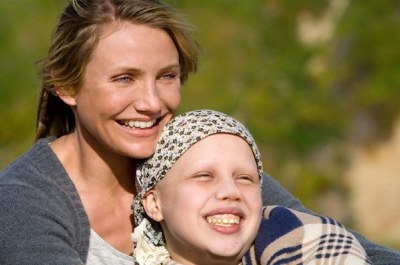cameron diaz movies
|
|
 Chapter 1 - How to deal with facing the death of a child
“When I was a kid, my mother told me that I was a little piece of blue sky that came in to this world because she and Dad loved me so much. It was only later when I realized that it wasn’t exactly true.” – Anna
When Sara Fitzgerald gave birth to Kate, she and her husband Brian rejoiced over their new baby girl. But joy turned into fear when their beloved child was diagnosed with a rare form of leukemia. Kate’s health became the fulcrum of the family, which grew with the birth of her sister Anna.
But Anna wasn’t just another welcome addition. She was a necessity, conceived as a perfect genetic match, specifically designed to save Kate’s life.
Cameron Diaz, who stars as Sara, relates, “When I first read the script, it was just one of those stories that haunted me. I connected with Sara, but I didn’t always agree with her, and that interested me.”
Eleven years into this routine—endless medical procedures, complications and hospital stays—Kate’s kidneys are failing. She needs a new one, so, as they have for all of her young life, her parents look to Anna. But Anna, all of 11 years old, says, for the first time, “What about me?” And, for the first time, she refuses to give up a part of herself for her sister Kate. Instead, she decides to sue her parents for the rights to her own body.
Anna’s decision will have profound and dire consequences. “Anna knows that her parents are going to be mad at her, that everyone is going to think she’s selfish and mean,” says young actress Abigail Breslin, who plays Anna. “But there is more to her decision; she has her reasons.”
“My Sister’s Keeper” is based on Jodi Picoult’s provocative novel of the same name. By the time it attracted the attention of filmmaker Nick Cassavetes, it was already the author’s best-selling work and a beloved topic of discussion and debate in book clubs worldwide. In films as disparate as “John Q,” “Alpha Dog” and “The Notebook,” Cassavetes has investigated the nuances of the human condition, the nature of love and free will and human dignity—all themes that resonate in Picoult’s book.
“When I read the novel, I was very moved,” says Cassavetes. “I started thinking about the movie as a simple story about how a family could deal with facing the death of a child, and I thought, ‘This is a story I’d like to tell.’”
Producer Mark Johnson adds that, in addition to the book’s compelling themes and characters, the structure lent itself well to film. “At its core, the book is about family and that really speaks to so many readers. Jodi taps into issues and situations to which we all connect and makes us wonder how we might react. What she also does very cleverly in the book—and hopefully we do in the film—is tell the story through multiple narrators, so you get the sense of the entire family speaking. It’s incredibly rich material for a filmmaker—an intimate family drama with huge implications, which is something that Nick really gravitates toward and understands,” Johnson notes.
Although several of Picoult’s books have been adapted for television, “My Sister’s Keeper” marks the first time her work will be brought to the big screen. “I’ve always believed that this story could work on screen, but I was especially excited when I learned it would be a feature film,” the author reveals. “Then to have the cast and the director they assembled, that is truly remarkable.”
To adapt the work from book to screenplay, the filmmakers knew it was important to find a screenwriter who appreciated and respected the novel’s themes and gradations, in addition to character and plot. “My Sister’s Keeper” reunites writer / director Cassavetes with screenwriter Jeremy Leven, with whom he previously collaborated with great success on “The Notebook.”
Leven, who, apart from his filmmaking career, has a background in child psychology, neuroscience and psychopharmacology, offers, “I suppose that my medical training gave me some added understanding. I really felt it was important to be sensitive to what this family was dealing with,” Leven attests, “and how a mother’s entire life can be defined by her investment in saving the life of her child, sometimes at the expense of others in the family. But, simply being a parent to five children myself and experiencing how a parent is so involved in the well-being of his or her children, gave me more insight than anything else.”
Johnson, who also produced “The Notebook,” believes that the Cassavetes/Leven combination was right for this project because “Jeremy has the ability to tell a very sensitive story but is also able to rein it in and, in so doing, make it more real. Nick directs the same way.”
The producer also admires Cassavetes’ way of working with actors. “I think the audience believes in the story, the characters and the situations because Nick has a way of making it feel real, that it is something that could happen. He takes a story that could potentially be overly sentimental, but doesn’t allow that to happen because he peoples it with very real and true performances,” Johnson says.
|